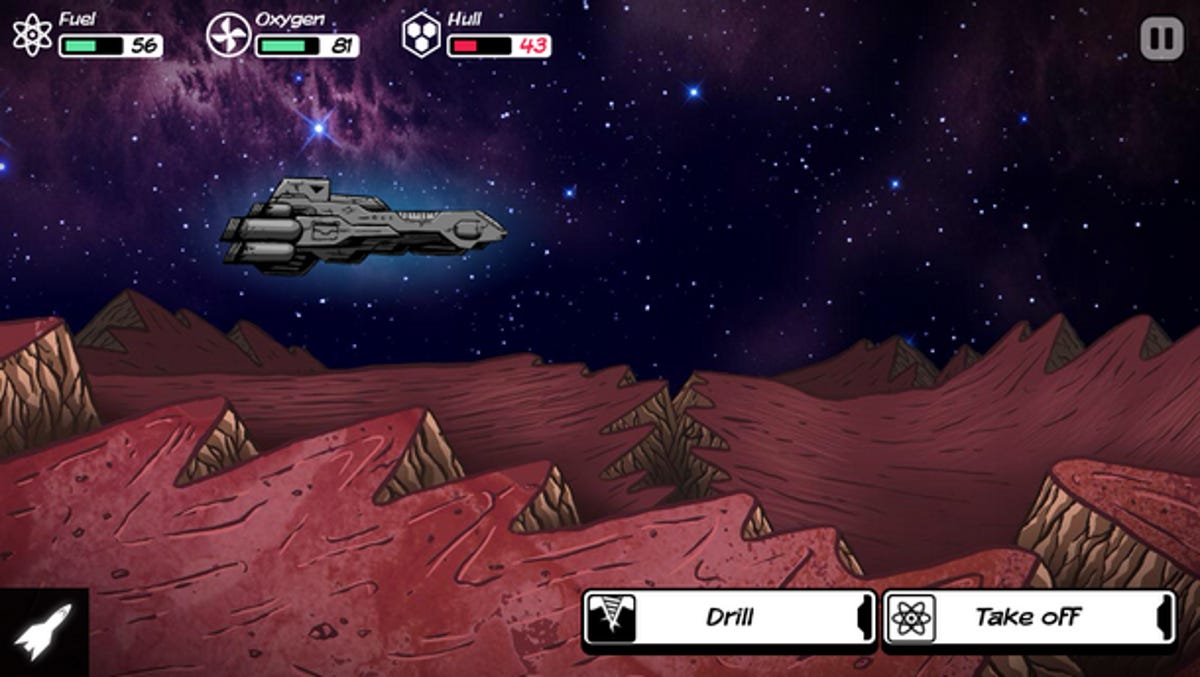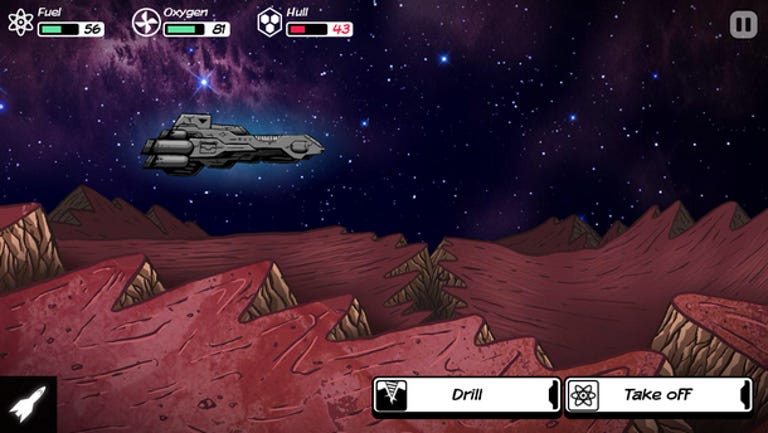 Why You Can Trust CNET
Why You Can Trust CNET Out There review: An exceptional sci-fi game with tons of replay value
Out There for iOS places you light years from Earth with only your spaceship, your wits, and hopefully a little luck to help guide you on the long voyage home.
Out There is a sort of a turn-based space survival game where your job is to stay alive long enough to get back to Earth. What's interesting is that it plays out a bit like the card game Solitaire; even if you do everything right, you're going to need a lot of luck in order to win.
The Good
The Bad
The Bottom Line
Out There isn't an action game, and you won't take part in big space battles. And no, there's no fire button or twitch-like controls at all. Instead, it's a dark, melancholic sci-fi adventure backed by an equally dark soundtrack, where your only hope of survival is to gather resources as you drift through space and hope you don't run out of gas before the next jump.
This game is also very difficult. I have already played numerous times, and while I've made significant progress in some games, I have yet to reach Earth. This isn't a bad thing, however, because one thing I have found, is that thankfully this game's enjoyment comes from the process of trying to survive, rather than trying to "win."
Great survival storyline
Every game in Out There starts with you waking up from a deep cryonic sleep, alone in your humble spacecraft, and far away from Earth. Your ship is equipped with a few technologies that will help you get the resources you need, but it's your job to jump from star to star, and gather resources from the planets you find.
As you enter each new star system, you'll get a little more of the story from your captain's log. The character you are playing is alone in space, keeping a journal in the hope that one day he'll share his adventure with the world. The log is where you can follow along with what your character comes across and sometimes you'll have to make decisions on how to proceed, so it's best to read them closely.
As you follow the story and gather resources, you'll come across black holes, supernovas, new technologies, abandoned spacecraft you can take over, and alien life. You'll also communicate with aliens and slowly learn their languages. But it's important to remember that everything you do and choices you make are about keeping your ship together, upgrading it, and staying alive as long as you can.

How to survive
When your ship has run out of gas, oxygen, or iron, your game is likely to end soon, but fortunately you can get more. There are three primary resources that every ship needs: hydrogen (H) or helium (He) for filling your gas supply; oxygen (O) for the air you breathe; and iron (Fe) for repairing the hull of your ship. Different planets have varying supplies of each element and you'll need to harvest those main resources regularly to survive.
You will quickly be able to discern which planets are likely to have gas and which will have metals just by looking at them. Your ship comes equipped with both a drill (for metals) and a hydrogen probe (for gas) that you'll use to get more of each resource.
What ends up happening is your decisions will revolve around what resource you need most, and then you'll act accordingly to stay afloat. Unfortunately (and this is where the luck part I mentioned earlier comes in), you don't have control over which planets you come across, and if you're almost out of fuel and no gas-rich planets are in sight, your game is going to end.
Technologies and crafting
To give yourself an advantage, you can craft new technologies using blueprints found or acquired from alien races, along with rare metals you'll mine alongside your main resources. Some might include an enhanced telescope that gives you more information about stars in your area, or an item called the Death Seed, which can turn a star into a black hole (and can be used as a wormhole to another location). As long as you have the resources, you'll be able to craft items like these to get an edge to push you further toward your goal.
Not unlike Solitaire
Most everyone has played the card game Solitaire in one of its many variations and knows that even if you make all the right choices, most of the time, you lose the game.
Out There is very similar. In some games you'll cover great distances while changing ships, discovering tech, and getting increasingly closer to Earth. Other games, your drill will break randomly so you can't mine iron and you might have no iron to repair it. After playing a few games, you'll start to recognize when the end is imminent, and you'll restart the game because there is little point in going on.
Also like Solitaire, even though there is this luck aspect to it, I still find the process of the game enjoyable. I can run through several games in a sitting, trying to get the right circumstances for covering the greatest distance and still feel like I'm having fun.
There is one minor detail I don't like about Out There, and that is the map view. You can only see a small portion of the map unless you have upgraded telescopes and other tech. I understand that it makes it more realistic, but if there were a larger star map, or I could scroll further away from my ship, it would be easier to plan my moves. As it is, sometimes you'll get to the end of a chain of star systems only to realize the next one is out of reach of your engines, forcing you to backtrack to planets where you've already exhausted the resources. In other words, the inability to plan on the smallish star map can be the difference between life and death.
Conclusion
Out There is a game that is in a class by itself. It's part turn-based game, part strategy, part inventory management, and even part choose-your-own adventure. But where the game really shines is balancing among gathering different types of resources, making the right choice when you have story options, and being lucky enough to find what you need to keep going. It's the process of keeping it all together to move further that keeps the game fun and gives it almost unlimited replay value.
Like I said, Out There is a lot like Solitaire in the sense that you'll play multiple games that will just end with no further moves to make. But also like Solitaire, you'll go right back and start the game again, if only to see if this time you're lucky enough to manage the game just right and -- hopefully -- finally complete the journey home. The current price is a little steep at $3.99, but I think with such a unique and satisfying experience, it is well worth the price tag.


